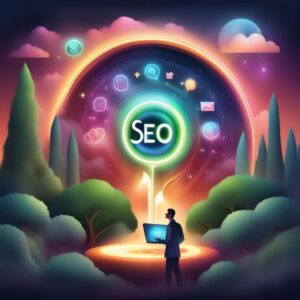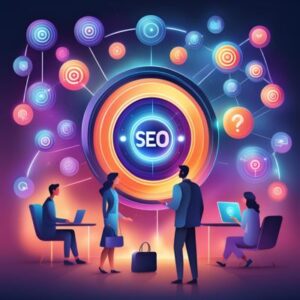Are you a small business owner looking for ways to increase your success online?
Search Engine Optimization (SEO) and Google Ads are two of the most effective strategies. But which one should you choose?
In this post, we’ll discuss why SEO is the better option over Pay Per Click (PPC) Google Ads if you’re looking to get the maximum return on investment. Read on to discover 7 reasons why SEO comes out ahead when it comes to boosting your website’s visibility and driving more leads.

1. SEO can be more cost-effective than PPC advertising in the long run

While both SEO and PPC advertising can be effective in driving traffic to a website, SEO can be more cost-effective in the long run. This is because SEO aims to improve the organic ranking of a website. This can eventually lead to sustained traffic and leads over time, without incurring ongoing costs. In contrast, PPC advertising requires a continuous investment to maintain traffic and leads, and once the budget runs out, the traffic and leads will stop.
Furthermore, the cost of PPC advertising can be significantly higher than that of SEO, particularly for highly competitive keywords and phrases. Advertisers bid against each other for the top ad spots, which can lead to higher costs per click. On the other hand, the cost of SEO is primarily the time and resources needed to optimize the website and can be a more cost-effective approach over time.
So, although PPC can be a useful short-term strategy, SEO can be a sustainable approach to generating high-quality organic traffic and leads with no ongoing costs.
2. SEO helps to attract organic search traffic, which can lead to higher conversions and more qualified leads.
SEO is the process of optimizing a website with the goal of ranking it higher in search engine results for keywords and phrases. By doing so, websites can attract organic search traffic from users who are actively looking for information related to those keywords. This type of traffic is valuable because these users are more likely to be interested in the products or services being offered on the website.
In contrast, PPC (Pay-Per-Click) ads primarily target people who are actively searching for a specific keyword and may not be as interested in the product or service being offered. While PPC ads can be effective at driving traffic to a website, the users who click on these ads are not necessarily looking for the specific products or services being advertised, and may be less likely to convert into paying customers. This is because PPC ads are often displayed to users who are not necessarily in the buying phase of the customer journey, but rather in the research phase.
SEO, on the other hand, helps to attract users who are actively looking for products or services related to the keywords and phrases that a website is optimized for. By providing valuable and relevant information through optimized website content, SEO can help to attract highly qualified leads who are more likely to convert into paying customers.
3. Organic search engine rankings are considered to be more credible and trustworthy than paid advertisements, which may be viewed as less reliable by some users.

Organic search engine rankings are highly regarded by many users due to their credibility and trustworthiness. Unlike paid advertisements that prioritize advertising or payment, organic results are solely based on the website’s relevance and authority. These factors significantly enhance organic results’ accuracy and unbiased information for users.
Moreover, organic results prove to be trustworthy as businesses cannot easily manipulate them compared to paid advertisements. Organic results’ content quality, relevance, and authority are essential factors when ranking, making them more dependable indicators for users.
Additionally, organic search results offer a better user experience with more relevant and useful information tailored to the user’s search. Paid advertisements appear as intrusive, disrupting the user experience, and often do not meet the user’s needs.
In summary, organic search engine rankings’ credibility and trustworthiness are attributed to their payment-independence, immunity to manipulation and fraud, and provision of a better user experience.
4. SEO can have a long-term impact on your website’s visibility and ranking, whereas PPC ads will disappear once the advertising budget runs out.
The impact of SEO on a website’s visibility and ranking is long-lasting because it is based on the quality and relevance of the website’s content and structure, as well as the authority of its backlinks. By consistently producing high-quality content and optimizing the website’s structure and backlinks, a website can maintain its visibility and ranking in search engine results over time.
In contrast, PPC advertising is based on paid placement of ads on search engine results pages. PPC ads are displayed to users who search for specific keywords and phrases, and businesses only pay for these ads when users click on them. While PPC ads can be effective at driving traffic to a website, they are limited by the advertising budget. Once the budget runs out, the ads will disappear, and the website’s visibility and traffic may decline.
PPC advertising drives website traffic in the short term, but unlike SEO, it does not contribute to a website’s visibility and authority over time. To maintain a website’s visibility and ranking in search engine results, applying SEO techniques is essential. This means businesses should consider the long-term impact of using PPC ads in conjunction with SEO when deciding on the best approach to market their website.
5. SEO can help target users based on their intent and behavior, while PPC ads are limited to specific keywords.
SEO is a strategy for optimizing a website’s content, structure, and backlinks to improve its relevance and authority in relation to specific keywords and phrases. It is beneficial for targeting users based on their intent and behavior by matching the website’s content with the user’s search query and behavior. For instance, an optimized website can show the best-rated builders in Brisbane when a user searches for “best builders in Brisbane”; thus, SEO helps users find specific content that matches their search intent.
SEO is also useful in targeting users based on their behavior and search history. By analyzing user behavior data and search history, an SEO strategy can be developed to make the website more appealing to users who are more likely to convert or take a specific action. This includes optimizing the website’s structure, navigation, and content for long-tail keywords, creating content that targets specific user segments, and enhancing user experience.
In comparison, PPC advertising is limited to specific keywords and targeting options. While PPC ads can be useful in targeting users who are actively searching for specific keywords or phrases, they are not effective in targeting users based on their behavior or intent.
Overall, SEO is a more efficient method of targeting users based on their intent and behavior. By implementing an SEO strategy, a website can attract a more significant audience, improve relevance and authority, and boost conversion rates.
6. Organic search results tend to have higher click-through rates than paid advertisements, as users are more likely to click on a website that appears at the top of the search results.
Studies show that users tend to click on organic search results more often than paid advertisements since they are deemed more reliable and trustworthy. This is because organic search results are generated based on the relevance and authority of the web page’s content, structure, and backlinks, which means that they are more likely to provide users with the information they are looking for.
In contrast, paid ads are viewed as being less reliable and may not provide users with the same level of information or relevance as organic search results. This is because paid ads are generated based on the advertiser’s targeting settings and bid amount, rather than the relevance and authority of the web page’s content, structure, and backlinks.
Both organic and paid search strategies have their strengths and weaknesses, meaning businesses should consider both when developing their marketing plan.
7. A well-executed SEO strategy can provide a higher return on investment compared to a PPC campaign, as the results are sustainable and have a longer-lasting impact.
SEO is an effective marketing strategy that yields a higher return on investment (ROI) compared to pay-per-click (PPC) campaigns. This is due to sustainable results over time because of optimizing a website’s content, structure, and backlinks to increase relevance and authority with specific keywords and phrases. SEO is most likely to attract individuals who are actively seeking a product or service related to your business, therefore increasing the conversion probability.
Furthermore, it helps build brand awareness and authority through establishing yourself as an expert in your field. On the other hand, PPC campaigns are temporary, require continuous investment, and may be less cost-effective in the long run. They may attract users who aren’t interested in a business’s products or services, which results in lower conversion rates.
In conclusion, an effective SEO strategy provides a higher ROI compared to a PPC campaign when it comes to sustaining long-term results, attracting qualified leads, and building brand awareness and authority in Warwick, Toowoomba and Brisbane.





